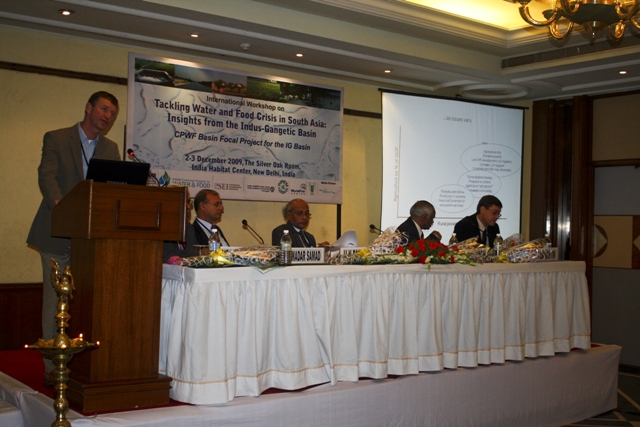"Water bills set to rise over 100% in new year" reads the loud headline in the Times of India, in New Delhi today. At the India Habitat Center here, the timing couldn't have been any better.
Times of India, New Delhi, Dec 2, 2009 (Read here)
Gathering in the city which just woke up to the water pricing issues and trying to ascertain the loss of revenue that it may have caused all this while, the forum would see the researchers from institutes like IWMI, World Fish, SEI, IIT, IARI, Jadavpur University presenting their findings from a two year long study on the Indus and Ganges rivers.
My guess is that, having the Secretary of Ministry of Water Resources, Government of India as the chief guest might just ensure (to a certain extent) that the results and findings would be heard and considered.
Madar Samad opens the workshop by emphasizing the need for research and for appropriate policy recommendations. This workshop on the IGB according to him, is the first step towards that goal. This would be followed by sharing the data to facilitate informed discussions.
The deliberations would ensure that there is a good interaction with the stakeholders and Civil Society Organizations to effect policy changes. From the sessions here we look forward to some intensive discussions that, towards the end can enhance the quality and relevancy of the research done so far

Simon Cook (speaking)
On CPWF Basin Focal Projects: Global Initiative for Local Solutions, Simon Cook (BFP Coordinator) deems this as a very important project. Here’s what he touches upon-
Challenge Program helps address an important problem of food crisis.- This has a bottom up approach. Over 60 projects have been initiated by IWMI in different continents.
- How do these address the globally relevant problems? Through this question came out the Basin Focal Program, in 2002.
- Water crisis has been making a myriad of headlines… from flood crisis in Mozambique, Yellow river, the Meckong , from Brazil , Andes and many more.
- All these headlines focus on crisis! We need to ask, "What can be done about it?"
- Behind every crisis is a broader solution.
- He discusses the situation that this challenge program is addressing.
- BFP addresses-
- How does the global crisis look at the ground level?
- What is the link between water food and poverty?
- How do river basins support people?
- How do these link together?
- Talks about the disconnect between what we perceive as problems (the researchers) and what the development problems are!
- Elaborates on the research plan referring to the observation that we need to connect to the above disconnect and this is the element that BFP addresses.
- These projects are very different but they have some sort of an order in the development trajectory. Non agricultural activity is increasingly getting important.
- Here we have a situation in Latin America where agri activity is a smaller part of the economy.
- Economies tend to move away from this and lead to shrinking agriculture and increasing poverty.
- Because of the depleting resources the people tend to indulge in livelihood activities, patterns of which are complicated and have fine linkages.
- Agriculture is increasingly being left behind leading to increased vulnerability!
- The livelihoods are influenced by 4 water related factors
- Availability/scarcity
- Access – who gets it ..how is it shared
- Hazard- how are people hit by water related problems like floods and draughts
- Use and Abuse of water – this, in his opinion is the most neglected aspect
(He finds this scheme useful in organizing his observations on poverty, livelihood and water.)
Before we find time to upload pictures from the workshop, here's a quick view of the participants. (Photo Credit: Prateek) Click for larger image
/articles/looking-beyond-water-crisis-asking-right-questions